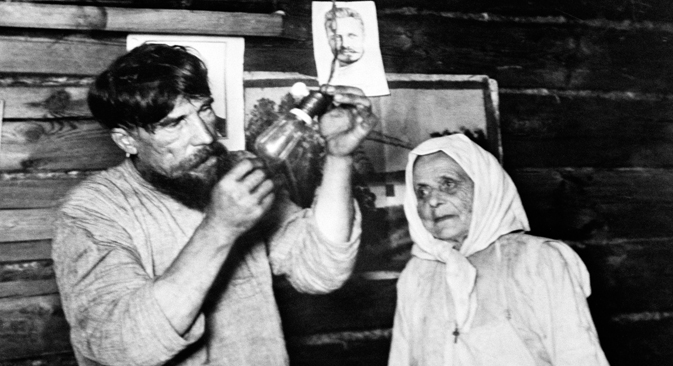
The first incandescent light bulbб 1925. Source: Arkady Shaykhet / TASS
At the end of September, State Duma deputies from the Just Russia party Ivan Grachev and Andrei Krutov, as well as Liberal Democratic deputy Vasily Tarasyuk, submitted a bill to the Duma that would cancel several provisions in the law governing energy conservation and efficiency.
The three deputies are opposed to stopping incandescent light bulb production. In their opinion, energy-efficient bulbs have yet to prove their efficiency in Russia and consumers should have a choice.
“We are receiving a lot of letters complaining that energy-efficient light bulbs emit unstable, flickering light, and that can lead to eye disease,” Grachev, who chairs the State Duma energy committee, told RBTH. He said that “energy-efficient light bulbs provoke voltage drops and cause crashes in the power grid.” The Duma is scheduled to vote on this initiative in November 2014.
Are Russians ready to part with their “Lenin Lamps”?
To this day, incandescent light bulbs are referred to as “Ilyich lamps” in Russia in honor of revolutionary leader Vladimir Ilyich Lenin, who drove the Soviet Union’s campaign to electrify the country. Russians are in no hurry to part with these light bulbs for several reasons.
Konstantin Bogachev, a senior professor at the Faculty of Radioelectronics and Telecommunications at the Higher School of Economics, affirms that energy-efficient light bulbs cause disruptions in the energy grid. “The majority of energy-efficient light bulbs in Russia are illegally imported from China,” Bogachev says.
“They have a simplified power supply scheme. It’s impossible to regulate their brightness, which causes strong pulsations in the form of a current that interrupts the work of the apparatus hooked to the grid.”
“The Ilyich light bulb,” in Bogachev’s opinion, “emits a continuous linear spectrum, and the wavelengths of the light in it are identical, which is good for vision.” Bogachev believes that LED lights are the safest of the energy-efficient light bulbs.
How to save energy in a light bulb
Design Manager at the Skolkovo Foundation’s energy-efficient technology cluster, Pavel Morozov, agrees that energy-efficient light bulbs help conserve electricity. However, he thinks the effect is only palpable if these light bulbs are produced on a large scale.
“On average, light accounts for just 10-15 percent of total electricity consumption in an apartment,” Morozov says. “The rest is used on other electronic appliances. Energy-efficient bulbs only help conserve a third of consumable light, which is not very significant in an apartment’s energy balance.”
The majority of experts do not think the use of energy-efficient light bulbs is a major problem in Russia. “It’s important to solve problems like obsolete electricity transmission infrastructure and the setting of appropriate tariff rates,” says Irina Mironova, a research engineer at the Institute of Energy Research at the Russian Academy of Sciences.
Victor Kolesnik, director of the Institute of Economics of Energy and Utilities at the Higher School of Economics, thinks it is important to take regional specifics into account when introducing energy-efficient light bulbs.
“In Russia, where the grid day is short and where we spend a lot of time in lighted premises, it’s not worth introducing such light bulbs on a massive scale,” Kolesnik says. “It’s not good for a person’s vision.”
And then there’s the recycling issue
Russia lacks an established procedure for recycling energy-efficient light bulbs. This, according to experts polled by RBTH, carries a risk for the environment and human health. “Energy-efficient light bulbs are gas-discharge devices that use mercury vapors,” Bogachev explains. “You can’t throw these kinds of bulbs in the trash because it would affect the environment.”
“It is a highly expensive and long-term process to recycle these light bulbs,” Morozov says. He maintains that there aren’t special recycling sites in many places in Russia and that the recycling process is centralized only for legal entities that sign direct contracts with suppliers of energy-efficient bulbs. In that case, he says, the company’s contractor collects the burned-out bulbs. “As a rule, ordinary people often throw light bulbs in the trash because they don’t know where to take them.”
Experts polled by RBTH were in agreement that Russian consumers need to be given a choice when it comes to light bulbs. Apart from that, the interests of domestic manufacturers need to be taken into consideration. “If we stop producing incandescent light bulbs in Russia, we let foreign producers make the money,” Kolesnik says. “It’s important not to curtail the production of our own incandescent lamps, but instead maybe try to modernize it.”
All rights reserved by Rossiyskaya Gazeta.
Subscribe
to our newsletter!
Get the week's best stories straight to your inbox